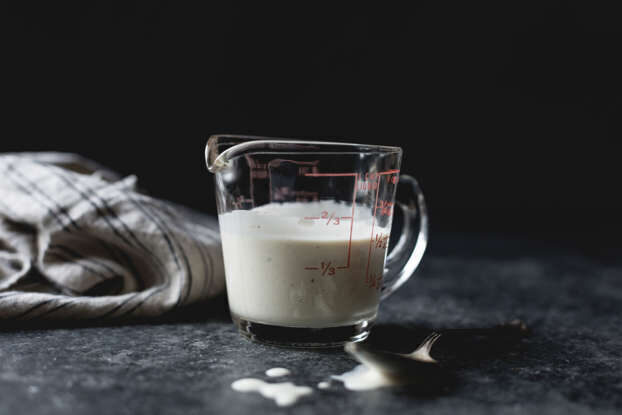There are various options available as substitutes for buttermilk, both dairy-based and non-dairy alternatives. Buttermilk itself is a liquid that remains after the production of butter, or it can be made by fermenting milk with lactic acid bacteria. It has a higher acidity and lower fat content compared to regular milk, giving it a distinct sour taste.
To create a dairy-based substitute, you can combine milk with ingredients like vinegar, lemon juice, cream of tartar, water, cream, plain yogurt, or plain kefir. These ingredients help to mimic the acidic nature of buttermilk and provide a similar flavor profile.
For those following a vegan or non-dairy diet, there are alternative options available. Soy-based, coconut milk-based, almond milk-based, and cashew milk-based alternatives can be used as substitutes for buttermilk. These non-dairy options offer a similar level of acidity and can be used in recipes that call for buttermilk.
It is important to note that all these buttermilk substitutes can be considered healthy when consumed as part of a balanced diet.
See more questions and expert answers related to Buttermilk.
→ Love Buttermilk? Get nutritional facts, tips from health experts, and more
Overview
Buttermilk is a fermented dairy drink. Traditionally, it was the liquid left behind after churning butter out of cultured cream. As most modern butter is not made with cultured cream but sweet cream, i.e. uncultured, most modern buttermilk is cultured.
Here are the nutrition facts for buttermilk:
- Serving Size: 1 cup (245 grams)
- Calories: 99
- Total Fat: 2.2 grams
- Saturated Fat: 1.3 grams
- Trans Fat: 0 grams
- Cholesterol: 14 milligrams
- Sodium: 261 milligrams
- Potassium: 370 milligrams
- Total Carbohydrate: 12 grams
- Dietary Fiber: 0 grams
- Sugars: 12 grams
- Protein: 8 grams
- Vitamin D: 120 International Units
- Calcium: 285 milligrams
- Iron: 0.1 milligrams
- Vitamin B12: 1.1 micrograms
Please note that these values may vary slightly depending on the brand and specific product.
Health Effects
Benefits
Buttermilk is effective in improving bone health. Dairy products are an excellent source of calcium which help in bones and teeth formation. Calcium is also a critical mineral in the body as it helps in maintaining signalling systems in the blood.
Buttermilk helps in gut health. The bacteria added to buttermilk act as probiotics, these help improve the digestive system health by repopulating the stomach with good bacteria needed for digestion.
Buttermilk is effective in providing more energy. The high levels of riboflavin makes it possible for the body to produce more energy, it also helps in regulating the body’s amino acids.
Possible side effects
Individuals who have dairy allergies should be very cautious when considering adding buttermilk into the diet as it may also trigger allergic reactions.
Quantity recommendations
It is recommended that one consumes two small glasses of buttermilk in a day, this will help to lower cholesterol and triglyceride levels in individuals with high cholesterol levels.
Disclaimer: This is for information purpose only, and should not be considered as a substitute for medical expertise. These are opinions from an external panel of individual nutritionists, and not to be considered as opinion of Microsoft. Please seek professional help regarding any health conditions or concerns.
